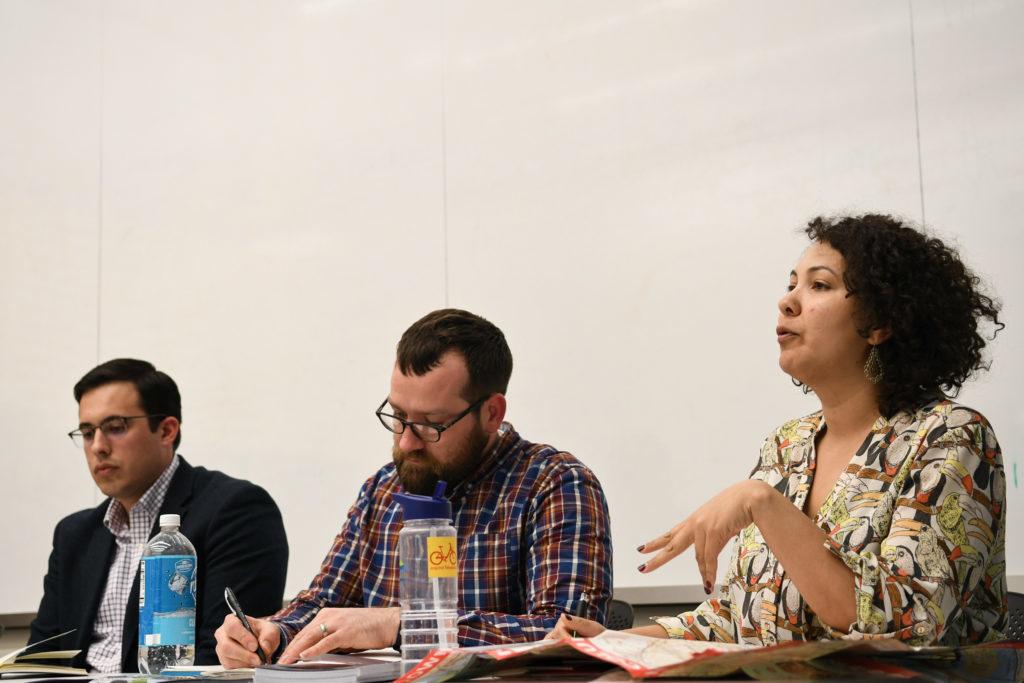A panel of transportation officials and advocates spoke at a neighborhood meeting Tuesday about the the relationship between pedestrians, cyclists and motorists in the District – especially given the newly popular dockless bike program.
The Foggy Bottom Association hosted a panel discussion with Kim Lucas, the D.C. Department of Transportation’s Capital Bikeshare coordinator; Greg Billing, the executive director of the Washington Area Bicyclists Association; Thomas Shannon, the city operations manager of the dockless bike program Mobike and officials from the Metropolitan Police Department.
After D.C. implemented a pilot program last September to test dockless bikes in the District, community members voiced concerns about the safety of the bikes and their large numbers in the city. The bikes can be left virtually anywhere in the city, rather docked than at preset stations. The panel took questions from the audience in an attempt to address those concerns.
Here are the three key takeaways from the meeting.
Improving relationships on D.C.’s roads
Several area residents complained that bikers ride recklessly on sidewalks and leave dockless bikes in hazardous places.
Billing said the best way to compel bikers to follow rules is to build better infrastructure elements, like protected bike lanes, that are physically separated from the street.
“There’s not enough safe places to bike,” Billing said. “There’s not enough driver education about the rules. There’s not enough enforcement and then from non-bicyclists you actually hear the same thing, which is that they don’t feel safe to the point where they don’t want to ride.”
DDOT proposed revamping Pennsylvania Avenue near campus last year, including adding bike lanes to the street.
Bike safety education
The panel also addressed Mayor Muriel Bowser’s Vision Zero initiative – which focuses on eliminating transportation-related fatalities in D.C. by 2024 and said advocates and city leaders should work together on those initiatives.
Billings said there are about 30 transportation fatalities – usually pedestrians or drivers, rarely bicyclists – in D.C. each year. He said authorities should take preventative measures to increase safety.
“We should be saying, ‘let’s prevent the fatality before it happens rather than letting a fatality happen and then going and changing it,’” Billings said.
The panelists discussed opportunities to educate both D.C. residents and visitors on bike safety, like installing signs at places where people often leave dockless bikes and hosting a city-wide clinic to ensure bikers do not ride too fast and stay in their allotted lanes.
Lucas said D.C. public schools currently only instruct second-grade students on bicycle safety, but DDOT hopes to work with the parks and recreation department to provide further safety education in all grades.
Shannon said Mobike wants to implement measures that will alert tourists to the appropriate rules and guidelines regulating dockless bikes in the areas that they are visiting for the first time.
Changes to dockless bikes systems
Lucas said DDOT is considering implementing fees for bikeshare companies operating in the city and fines for violations like parked bikes blocking pedestrian traffic, but they have not yet committed to a complete plan. The dockless program remains in a pilot phase.
D.C. has already limited the maximum number of dockless bikes that a company can operate in the city to 400 in an attempt to ensure the bikes do not become a burden.
“We need stronger requirements with regards to where the bikes can be left, some technical requirements for the bikes themselves and to also charge money for them to operate in the District so that we can then fund District resources,” Lucas said.




